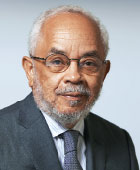The Justice and Affirmative Action
For a long time, I have thought that writing about single lives is at the heart of what my friend and colleague Yale Professor Michael Norko calls “vocation.” In this case, the term would refer to the spirituality that resides within the composing of biographies. Norko has explored different definitions of what one might mean by spirituality in a specific context. One that I like is “doing what is in the interest of others and oneself.” Norko was aware that God is not mentioned in that definition, yet he concluded that “we must contemplate the definition of spirituality individually to reveal its application to our daily work, which brings us to the topic of vocation” (see “What is Truth? The Spiritual Quest of Forensic Psychiatry” in the March 2018 Journal of the American Academy of Psychiatry and the Law).
This brief exposition of Norko’s “vocation” has guided my examination of biographical writing. I always want to understand how the subject approached life; the expressed relatedness to others; the salience of work, of play; the practical application of effort and time to specific activities; the connection between love of neighbor and service through one’s profession; the image of self as represented in one’s work and personal actions.
It is with Michael Norko in mind that I settled down to reading the February 22 New York Times Magazine article by Danny Hakim and Jo Becker: “The Long Crusade of Clarence and Ginni Thomas.” It is a detailed, complex piece about a current Supreme Court justice and his wife. Both are ardent conservatives who enjoy the limelight as leaders of the anti-libertarian movement in this country. I concentrate here only on Clarence Thomas’s view that affirmative action undercuts self-reliance. I have no interest at all in his personal health, and I have never met him.
We learn from Thomas’s biographers that he was raised by his grandfather in the South and graduated from the College of the Holy Cross. From there, he attended Yale Law School. It appears that graduation did not bring prestigious job offers. In addition, some individuals apparently suggested that his acceptance to Yale was based on preferential treatment. In other words, he may have been a token Yale student, pulled from the line of Black applicants and pushed ahead because of his minority status. Those Yale years became an important event in Thomas’s life. From then, he matured into a zealous anti-affirmative action ambassador, with a will to destroy the affirmative action movement. Of course, there are others intent on accomplishing that objective. However, Thomas’s voice carries weight. People listen to him when he speaks. He also knows, because many have praised him in public, that he has access to distinguished social groups in which few Blacks gain entrance and his presence is distinctive.
I understand that suggesting he benefited from affirmative action may have left him disappointed, less authoritative than he wanted to be. Only he knows, of course. But why would he dismantle a mechanism that has served so many others in past years? His biographers did not mention whether he has a replacement for affirmative action. I am curious about this point. I wonder how he thinks about these things. Education is linked to mental health. When access to educational institutions is circumscribed and identity development is limited, so is generous access to excellence.
I anticipate the suggestion that it is not the jurist’s role to find solutions to sociopolitical dilemmas. As we all know, that is an antiquated principle. Many professions have tried on that excuse, including the medical profession, to no useful end. Jurists these days must be aware of their decisions’ effects on neighbors. I return to Norko’s comments on the link between spirituality and vocation. I just wish I could see the interest in others, the love of neighbor that the Justice brings to these debates. Affirmative action does not undercut self-reliance. Such a claim mocks efforts at self-improvement. ■




